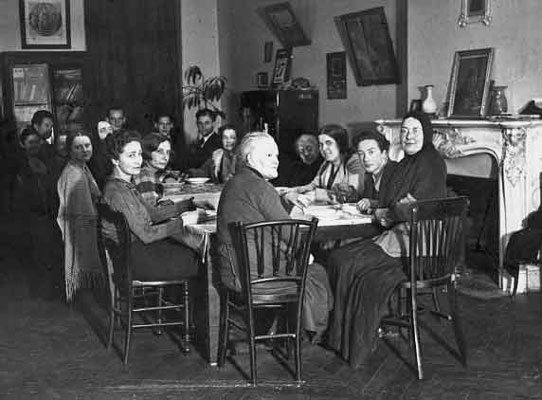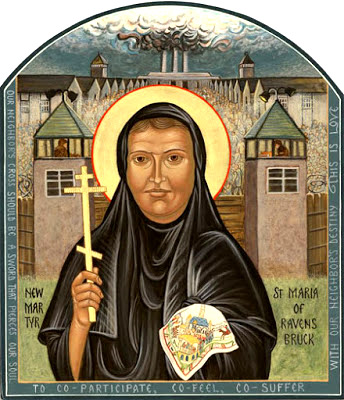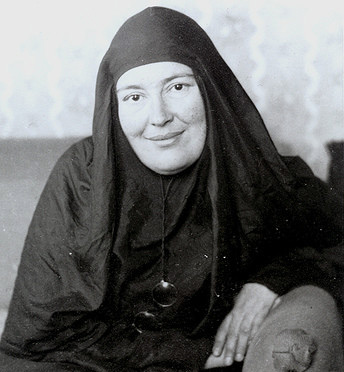“The way
to God lies
through love of
people” -
Mother
Skobtsova
Born
into a family of aristocratic Russian
landowners in 1891, Elizaveta (Liza)
Iur’evna Pilenko trod a long and difficult
path from her birthplace near the Black Sea
to her martyr’s death in one of Hitler’s
concentration camps. During her adolescence,
Liza rejected her Orthodox religious faith.
While at the university in St. Petersburg,
she was involved with an avant-garde
literary circle and later published two
volumes of poetry. She married impetuously
at eighteen and soon divorced. During the
turmoil following the Bolshevik Revolution,
Liza, with her mother, her daughter Gaiana,
and her second husband Daniil Skobtsov, fled
Russia and eventually settled in Paris in
1922.
With the death of Liza’s youngest daughter
Nastia in 1926, she rediscovered faith in
God and saw a “new road before me and a new
meaning in life... to be a mother for all.”
She sought out destitute Russian refugees in
hospitals and mental asylums and in the
slums to help them, saying, “They have no
need of sermons; they need the most basic
thing of all, compassion.”
In 1932, when she was forty-one years old,
Liza received a marital separation, which
was authorized by the Orthodox Church
because of her decision to enter the
monastic life. She made her profession as an
Orthodox nun under the guidance of
Metropolitan Evlogii, who gave her her new
name, Maria, in memory of St. Mary of Egypt.
“Like this Mary, who lived a life of
penitence in the desert,” Evlogii told
her, “go and act and speak in the
desert of human hearts.” Later he wrote of
her: “When she took the veil she brought as
a gift to Jesus all her talents. Among them,
a true gift of God, was the knowledge how to
approach those who had lost the right path
without despising their weaknesses and
faults.”
After visiting Orthodox convents in Estonia
and Latvia, Mother Maria was convinced that
a new form of monasticism was required to
meet the needs and circumstances of the
Russian émigrés in France. Back in Paris,
she lived as a “monastic in the
world,” pushing the borders of monasticism
past their former limits—and sometimes
disturbing the more traditionally-minded as
she did. Her monastery was the world around
her, where she sought to soothe human
suffering in any way that she encountered
it, recognizing that “each person is the
very icon of God incarnate in the world.”
 Mother Skobtsova's small
house of hospitality in Paris
Mother Skobtsova's small
house of hospitality in Paris
Soon Mother Skobtsova
opened a small house of hospitality for
the needy, trusting God to provide the
funds for it. In 1934, the work was
transferred to a larger house at 77 rue
de Lourmel, where she provided meals and
a place to sleep for the hungry and
homeless. The house, with its drawing
room and a chapel adorned with
embroidery and icons from Maria’s
talented hand, also served as a meeting
place for intellectual Russian Orthodox.
Over the following years, she opened
another hostel for the destitute and a
sanatorium for the ill while she herself
lived in a small, unheated room.
On June 14, 1940, Paris fell to the Nazis.
Mother Maria joined some colleagues in
preparing and dispatching food parcels and
funds to families of more than 1,000 Russian
émigrés who were imprisoned by the Nazis.
She also hid Jews at Lourmel and forged
documents for them. In 1942, 6,900 Jews were
rounded up and kept for five days in the
Velodrome d’Hiver, Paris’ sports stadium,
with only one water faucet and ten latrines.
She managed to enter the stadium and,
assisted by garbage collectors, smuggled out
several Jewish children in garbage bins.
In February 1943 Mother Maria, her son Iura,
and Lourmel’s chaplain, Father Klepinin,
were arrested. In response to the accusation
that Maria was helping “yids,” her mother
Sophia told the Gestapo agent: “My daughter
is a genuine Christian, and for her there is
neither Greek nor Jew, only individuals in
distress. If you were threatened by some
disaster, she would help you too.”
Klepinin and Iura died in Dora concentration
camp. Mother Maria was deported to
Ravensbrück concentration camp. There, as
prisoner Number 19263, she continued her
ministry among her companions, with the
strength of her faith giving them
encouragement and love in the midst of
hopelessness and despair. Finally, Maria,
her health broken, could no longer pass the
roll call on Good Friday 1945. She stepped
into the line with those women condemned to
die, hoping to inspire them to meet their
fate with faith in God. As one witness
wrote, “She offered herself consciously to
the holocaust . . . thus assisting each one
of us to accept the cross. . . . She
radiated the peace of God and communicated
it to us.”

Icon of Maria Skobtsova - martyred
at Ravensbruck concentration
camp
Mother Maria Skobtsova was gassed on Holy
Saturday. Ravensbrück’s women prisoners from
France were liberated through the auspices
of the International Red Cross on Easter
Sunday.
Anthony Bloom, Orthodox Metropolitan of
Sourozh and Great Britain, noted that Mother
Maria is remembered in the context of her
times—the Russian Emigration, the French
Resistance, and the Nazi concentration
camps. However, he added, “her achievement
extends beyond the circumstances of her
life, and it outlives them. Since her life
was completely interwoven with the destiny
of her contemporaries, their turmoil was
hers, their tragedy was hers. And yet she
was not swept away by it. She was anchored
in God and her feet rested on the Rock.”
From the writings
of Mother Maria
What is most
essential, most determining
in the image of the cross is
the necessity of freely and
voluntarily accepting it and
taking it up. Christ freely,
voluntarily took upon
Himself the sins of the
world, and raised them up on
the cross, and thereby
redeemed them and defeated
hell and death. To
accept the endeavor
and responsibility
voluntarily, to freely
crucify your sins - that is
the meaning of the cross,
when we speak of bearing it
on our human paths.
Freedom is the inseparable
sister of
responsibility. The
cross is this freely
accepted responsibility,
clear-sighted and
sober.
(Essential
Writings, p. 64)
The way
to God lies through love
of people. At the
Last Judgment I shall
not be asked whether I
was successful in my
ascetic exercises, nor
how many bows and
prostrations I
made. Instead I
shall be asked, Did I
feed the hungry, clothe
the naked, visit the
sick and the
prisoners. That is
all I shall be
asked. About every
poor, hungry and
imprisoned person the
Savior says "I:" "I
was hungry, and thirsty,
I was sick and in
prison." To think
that he puts an equal
sign between himself and
anyone in need... I
always knew it, but now
it has somehow
penetrated to my sinews.
It fills me with awe.
|
This
article is adapted from the book, Even
Unto Death: Wisdom from Modern Martyrs,
edited by Jeanne Kun, The Word Among Us
Press, ©
2002. All rights reserved. Used with
permission.

